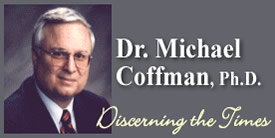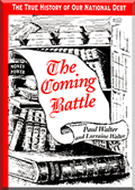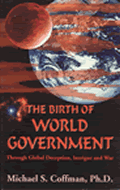Other
Coffman
Articles:
Return to
Earth Worship,
Part 1
How Government Regulations Threaten America
THE WAR ON PROPERTY
RIGHTS & WHAT IT MEANS TO YOU
PART
1 of 3
By
Dr. Michael S. Coffman Ph. D.
August 23, 2006
NewsWithViews.com
The War of Worldviews
Our view of reality and the role of government in our lives greatly influence how we view property rights. Our public education system no longer teaches foundational U.S. Constitutional history and the principles that we derive from it. Consequently, we have become a nation of two worldviews and many of us cannot recognize that we are undermining the very form of government that made America the greatest nation on earth.
The two philosophies that have been struggling for supremacy for the past 250 years, those of John Locke and Jean Jacques Rousseau, have divided America. America�s Constitution is rooted in the thought of John Locke (1632-1704), who�s Two Treatises on Government (1689) provided a framework for England�s Glorious Revolution of 1688 and the American Revolution of 1776. Locke demonstrated that the foundation of a progressive civilization, as outlined in his Second Treatise of Government, begins with natural, God-given rights:
Man being born, as has been proved, with a title to perfect freedom and an uncontrolled enjoyment of all the rights and privileges of the law of Nature, equally with any other man, or number of men in the world, hath by nature a power � to preserve his property- that is, his life, liberty, and estate, against the injuries and attempts of other men.
Thomas Jefferson made them the cornerstone of the Declaration of Independence when he penned, �Laws of Nature and of Nature�s God.� The purpose of government, according to Locke, is to join with others to �unite, for the mutual preservation of their lives, liberties and estate, which I call by the general name, property. The great and chief end, therefore, of men uniting into commonwealths, and putting themselves under government, is the preservation of their property.� (Italics added) This fundamental principle became the cornerstone of the Declaration of Independence �That to secure these Rights, [of life, liberty and the pursuit of happiness (property)] Governments are instituted among Men, deriving their just Powers from the Consent of the Governed.�
Locke�s political philosophy promotes individual rights and limited constitutional government as the basis of freedom and economic security. Jean-Jacques Rousseau (1712-1778) opposed Locke�s model in the name of the wholeness of man, arguing that it divides man by focusing on self-interest, individual rights, and property. Rousseau sees �man as a malleable creature� to be molded by an enlightened government. He �favors primitive man, the noble savage who lives in simple equality with his fellow man, with few needs, a limited appetite, over man in civilized society.�
Rousseau wrote the Social Contract in 1762, which focuses on the abstract �general will� of the people. Today the same concept is expressed as the �public good� or the �public interest� and forms the heart of socialism. Although Rousseau championed individual freedom from the state and religion, there is nothing to keep the state from defining the �general will� as the �state�s will.� Rousseau�s philosophy therefore inevitably leads to a �statist� approach to government, in which the state is superior to the individual and all individual rights are derived from the state � including property rights. According to Rousseau, property rights bind the poor, give �new powers to the rich� thereby destroying �natural liberty� and equality and convert �usurpation into unalterable right.�
Contrary to the Rousseau model of governance which condemns individualism and self-interest, the Locke model depends on private property rights and self-interest to motivate individuals to do something a better way or create a new product or service that serves a human need. To prevent abuse, both Locke and our founders held that private property rights must have some limits. In this approach, however, the legislature designs only those laws needed prevent the use of property in ways that cause real harm to other people or to their property, not to achieve some altruistic social goal. So important is this principle that the U.S. Supreme Court said in Lynch v. Household Finance Corporation (1972):
[T]he dichotomy between personal liberties and property rights is a false one. Property does not have rights. People have rights. The right to enjoy property without unlawful deprivation, no less than the right to speak or the right to travel, is in truth, a �personal� right, whether the �property� in question be a welfare check, a home, or a savings account. In fact, a fundamental interdependence exists between the personal right to liberty and the personal right in property. Neither could have meaning without the other.
Without the right of private, unencumbered property, people cannot have liberty. True freedom is only an illusion if they are dependent upon the state for water, food, shelter, and other basic needs. When the government, rather than individuals, own the fruits of the citizens� labors, nothing is safe from abuse by either a democratic majority in the name of a public good, or a tyrant. In their book Property Rights, Understanding Government Takings and Environmental Regulation, Nancie and Roger Marzulla note, �Ultimately, as government dependents, these individuals are powerless to oppose any infringement on their rights�due to the absolute government control over the fruits of their labor.� Nowhere is this more apparent than in the old Soviet Union, where all property belonged to the state. No one could speak out against the government for fear of their government evicting their family or taking away their job by the local communist commissar.
Another problem arises from government ownership of land. While environmentalists and socialists blame greed and the self-interest of private property owners for the environmental destruction, that is not accurate. Ironically, it was because no one owned our air or waterways that pollution occurred. It is the natural consequence of the law of the commons; the air and waterways are not property owned by individuals, but theoretically belong to all people. Since there was no pride of ownership, however, there was no motivation to care for or optimize property held in common with the millions of other citizens. Called the Tragedy of the Commons, everyone sinks to the lowest common denominator, the economic structure stagnates, and the infrastructure collapses.
Although property rights motivate individuals to be creative and take risk in finding a better way or product, Rousseau socialism does just the opposite. Rousseau socialism places control in the hands of unaccountable, unelected government bureaucrats whose primary incentive is to make their regulatory jobs easier and more efficient so they can build bigger empires at the people�s expense. Unless there is strong oversight of bureaucrats � something politicians rarely do � there is no accountability to keep them from administering laws in an arbitrary and capricious manner leading to corruption.
|
Subscribe to the NewsWithViews Daily News Alerts! |
While Rousseau socialism does not destroy property rights as effectively as totalitarianism or communism, it nonetheless places a stranglehold on it and reduces economic and personal freedom in proportion to the amount of regulation imposed. Tragically, environmental and planning laws passed at all levels of government over the past thirty-five years has taken thousands of towns, cities, counties and states from the Locke model of governance by the consent of the governed to the Rousseau model where the government rules supreme over the citizens. Many communities, however, have councils who want to do the right thing for their citizens, but their professional planners and lawyers tell them what they need to do to implement socialist smart growth and environmental protection in their communities. It is to that group that the following information will be most informative. It clearly shows socialist smart growth and environmentalism come at an extremely high cost to citizens. For part two click below.
� 2006 Michael Coffman - All Rights Reserved
Dr. Michael S. Coffman received his BS in Forestry and MS in Biology at Northern Arizona University at Flagstaff, Arizona and his Ph.D. in Forest Science at the University of Idaho at Moscow in 1966,1967, and 1970 respectively. Since then he has become a respected scientist and ecologist who has been involved in ecosystem research for over twenty years in both academia and industry. He taught courses and conducted research in forest ecology and forest community dynamics for ten years at Michigan Technological UniversityCa leading forestry school in the Midwest. While there, he published a book on forest ecosystem classification in Upper Michigan and Northern Wisconsin, which has become the standard for classification in the region. He also assisted the U.S. Forest Service in developing an Ecological Land Classification System for each of the National Forests in Region-9.
Until 1992 Dr. Coffman was a manager for Champion International, a leading forest and paper products company in the United States. During his tenure with Champion, he became Chairman of the Forest Health Group within NCASI (National Council for the Paper Industry for Air and Stream Improvement), a respected scientific research group for the Paper Industry. In this, and other related responsibilities, he was responsible for millions of dollars of research and became intimately involved in such national and international issues as acid rain, global climate change, wetlands, cumulative effects and biological diversity. During this time he was a spokesperson for the Paper Industry for the media.
Dr. Coffman is currently President of Environmental Perspectives, Inc. He also serves as Executive Director of Sovereignty International, Inc and the Local Environment and Resource Network (LEARN). He provides professional guidance and training in defining environmental problems and conflicts, and developing solutions to specific issues as well as the hidden dangers of international treaties and agreements that threaten our Constitutional protections, especially property rights. He played a key role in stopping the ratification of the Convention on Biological Diversity (Biodiversity Treaty) in the U.S. Senate one hour before the ratification vote by anticipating and exposing the unbelievable agenda behind the treaty. He has written three books exposing the environmentalist phenomenon; The Birth of World Government, Saviors of the Earth? The Politics and Religion of Environmentalism, and Environmentalism! The Dawn of Aquarius or the Twilight of a new Dark Age?
In his present capacity as Exec. Director of Sovereignty International, Inc. he is intimately involved with the science that drives the issue of global warming and sustainable development and global political agenda behind the effort to create global governance. Dr. Coffman speaks to a variety of groups nationally who are interested in the scientific truth and political agenda behind global warming and other environmental issues to advance global governance.
LEARN provides knowledge to local citizens on how to help local government attain equal powers with the federal and state governments in implementing environmental laws in order to protect both the environment and the rights of local citizens.
E-Mail: mcoffman@adelphia.net
Unless there is strong oversight of bureaucrats � something politicians rarely do � there is no accountability to keep them from administering laws in an arbitrary and capricious manner leading to corruption.











